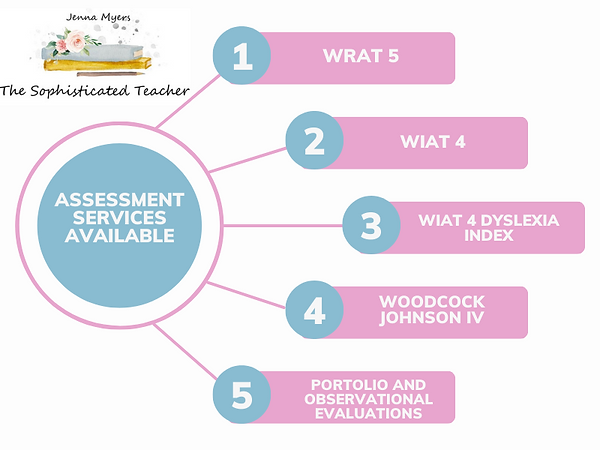
Note: Assessment services will resume in May 2025. We are correctly booked. Please contact us for scheduling.
What We
Offer
WRAT 5
The WRAT 5 (Wide Range Achievement Test, Fifth Edition) was updated in 2017 and allows for paper-pencil or digital assessment options.
Purpose: It is a screening tool used to assess basic academic skills needed to learn and communicate effectively. It also gives insight to an individual's thought process. It is an initial screener, giving a quick and broad picture of the individual's overall functioning.
Subtests: 4 (see below)
Focus:
-
Word Reading measures untimed letter identification and word recognition. The examinee reads aloud a list of letters/words.
-
Sentence Comprehension measures the ability to identify the meaning of words and to comprehend the ideas and information in a sentence using an untimed modified cloze procedure. Each item requires the examinee to read (aloud or silently) a sentence with a word missing, and then say the word that best completes the sentence.
-
Spelling measures an individual's ability to write letters and words from dictation without a time limit.
-
Math Computation measures an individual's ability to count, identify numbers, solve simple oral math problems, and calculate written math problems with a time limit. Problems are presented in a range of domains, including arithmetic, algebra, geometry, and advanced operations.
-
A Reading Composite score is created by combining the Word Reading and Sentence Comprehension standard scores.
Ages: 3 - 99
Administration Time: Approximately 15 to 25 minutes for ages 5 to 7, and 30 to 40 minutes for ages 8 and up
WJ IV
Woodcock Johnson IV (WJ IV) is a comprehensive assessment. It consists of three test batteries: the Woodcock–Johnson IV Tests of Cognitive Abilities (WJ IV COG), the Woodcock–Johnson IV Tests of Oral Language (WJ IV OL) and the Woodcock–Johnson IV Tests of Achievement (WJ IV ACH).
*Available in late 2023
WIAT 4 and Dyslexia Index
The WIAT 4 (Wechsler Individual Achievement Test®, Fourth Edition) is newly expanded, including a dyslexia screener (2020).
Purpose: Used to measure strengths and weaknesses of an individual. This test can pinpoint gifted abilities and twice gifted abilities. It can also assist in planning instruction and accommodations. It is considered a comprehensive assessment and can be used to monitor progress as well.
Subtests: 20
3 main categories with additional dyslexia index subsets available.
Focus:
• Reading: Word Reading and Reading Comprehension
• Written Expression: Spelling, Sentence Comprehension, and Essay Comprehension (essay composition begins at grade 4)
• Mathematics: Numerical Operations and Math Problem Solving
Dyslexia Index Subtests:
• Phonemic Proficiency: Measures speed and accuracy of phonological manipulation
• Orthographic Fluency: Measures speed of irregular word reading
• Decoding Fluency: Measures speed of pseudoword reading
• Orthographic Choice: Measures recognition spelling skills
• Sentence Writing Fluency: Measures speed
Ages: 4 - 50
Administration Time: Approx 90 - 150 minutes
